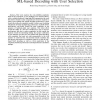Free Online Productivity Tools
i2Speak
i2Symbol
i2OCR
iTex2Img
iWeb2Print
iWeb2Shot
i2Type
iPdf2Split
iPdf2Merge
i2Bopomofo
i2Arabic
i2Style
i2Image
i2PDF
iLatex2Rtf
Sci2ools
TSP
2016
2016
Performance-Complexity Analysis for MAC ML-Based Decoding With User Selection
—This work explores the rate-reliability-complexity limits of the quasi-static K-user multiple access channel (MAC), with or without feedback. Using high-SNR asymptotics, the work first derives bounds on the computational resources required to achieve near-optimal (ML-based) decoding performance. It then bounds the (reduced) complexity needed to achieve any (including suboptimal) diversity-multiplexing performance tradeoff (DMT) performance, and finally bounds the same complexity, in the presence of feedback-aided user selection. This latter effort reveals the ability of a few bits of feedback not only to improve performance, but also to reduce complexity. In this context, the analysis reveals the interesting finding that proper calibration of user selection can allow for near-optimal ML-based decoding, with complexity that need not scale exponentially in the total number of codeword bits. The derived bounds constitute the best known performance-vs-complexity behavior to date for ...
TSP 2016 |
| Added | 11 Apr 2016 |
| Updated | 11 Apr 2016 |
| Type | Journal |
| Year | 2016 |
| Where | TSP |
| Authors | Hsiao-feng Lu, Petros Elia, Arun Kumar Singh |
Comments (0)

